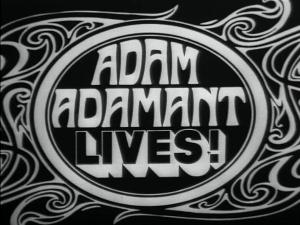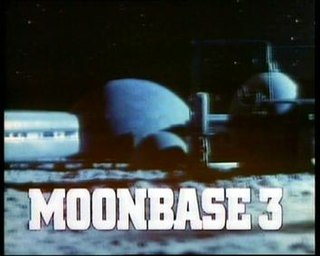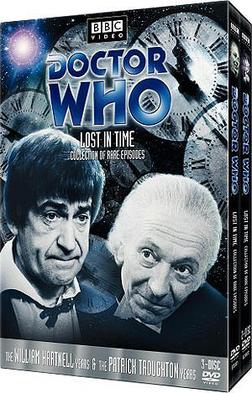
Adam Adamant Lives! is a British adventure television series that ran from 1966 to 1967 on BBC 1, starring Gerald Harper in the title role. The series was created and produced by several alumni from Doctor Who. The titular character was an adventurer born in 1867, who had been revived from hibernation in 1966, thus offering a satirical look at life in the 1960s through the eyes of an Edwardian. In 2020, Big Finish Productions reimagined the series as an audio drama.

Invasion of the Dinosaurs, simply titled Invasion in Part One, is the second serial of the 11th season of the British science fiction television series Doctor Who, which was first broadcast in six weekly parts on BBC1 from 12 January to 16 February 1974.

A for Andromeda is a British television science fiction drama serial first made and broadcast by the BBC in seven parts in 1961. Written by cosmologist Fred Hoyle, in conjunction with author and television producer John Elliot, it concerns a group of scientists who detect a radio signal from another galaxy that contains instructions for the design of an advanced computer. When the computer is built, it gives the scientists instructions for the creation of a living organism named Andromeda, but one of the scientists, John Fleming, fears that Andromeda's purpose is to subjugate humanity.

The Quatermass Experiment is a British science fiction serial broadcast by BBC Television during the summer of 1953 and re-staged by BBC Four in 2005. Set in the near future against the background of a British space programme, it tells the story of the first crewed flight into space, supervised by Professor Bernard Quatermass of the British Experimental Rocket Group.
Tele-snaps were off-screen photographs of British television broadcasts, taken and sold commercially by John Cura. From 1947 until 1968, Cura ran a business selling the 250,000-plus tele-snaps he took. The photographs were snapped in half of a normal frame of 35mm film, at an exposure of 1/25th of a second. Generally around 70–80 tele-snaps were taken of each programme. They were mostly purchased by actors and directors to use as records and examples of their work before the prevalence of videocassette recorders.

The Smugglers is the completely missing first serial of the fourth season in the British science fiction television series Doctor Who, which was first broadcast in four weekly parts from 10 September to 1 October 1966.

Several portions of the long-running British science-fiction television programme Doctor Who are no longer held by the BBC. Between 1967 and 1978, the BBC routinely deleted archive programmes for various practical reasons—lack of space, scarcity of materials, and a lack of rebroadcast rights. As a result, 97 of 253 episodes from the programme's first six years are currently missing, primarily from Seasons 3, 4 and 5, leaving 26 serials incomplete. Many more were considered lost until recovered from various sources, mostly overseas broadcasters.

Moonbase 3 is a British science fiction television programme that ran for six episodes in 1973. It was a co-production between the BBC, 20th Century Fox and the American ABC network. Created by Doctor Who producer Barry Letts and script editor Terrance Dicks as a realistic alternative strand of TV science-fiction, it was not a commercial or critical success.
The Underwater Menace is the half-missing fifth serial of the fourth season in the British science fiction television series Doctor Who, which was first broadcast in four weekly parts from 14 January to 4 February 1967.
The Enemy of the World is the fourth serial of the fifth season of the British science fiction television series Doctor Who, which originally aired in six weekly parts from 23 December 1967 to 27 January 1968.
The Wheel in Space is the seventh and final serial of the fifth season in the British science fiction television series Doctor Who, which originally aired in six weekly parts from 27 April to 1 June 1968.

Compact is a British television soap opera shown by BBC Television from January 1962 to July 1965, created by Hazel Adair and Peter Ling.
Citizen James is a BBC sitcom that ran for three series between 24 November 1960 and 23 November 1962. The show featured comedian and actor Sid James and Sydney Tafler with Bill Kerr and Liz Fraser appearing in early episodes. It was initially written by the comedy writing team of Galton and Simpson, who based the characters very much on the "Sidney Balmoral James" and "Bill Kerr, the dim-witted Australian" roles that they had played in Hancock's Half Hour.

Doctor Who – Lost in Time is a BBC three-disc boxset DVD released in 2004. It is a collection of restored Doctor Who episodes and clips from stories that are incomplete or missing from the Corporation's archives. There were, at the time of release, 108 missing episodes, all from the black-and-white 1960s era. Although the search goes on many or all of these episodes may be lost forever—hence this collection's title.
The Dad's Army missing episodes are lost episodes and sketches of the British television sitcom Dad's Army. The programme ran for nine series from 31 July 1968 to 13 November 1977. Three out of six episodes from the second series and two of the four Christmas sketches are missing because, at that time, the BBC routinely reused videotape as a cost-saving measure.

Out of This World is a British science fiction anthology television series made by the ITV franchise ABC Weekend TV for ITV. It was broadcast on ITV in 1962. A spin-off from the Armchair Theatre anthology series, each episode was introduced by the actor Boris Karloff. Many of the episodes were adaptations of stories by science fiction writers including Isaac Asimov, Philip K. Dick and Clifford D. Simak. The series is described by the British Film Institute as a precursor to the BBC science fiction anthology series Out of the Unknown, which was created and produced by Out of This World creator Irene Shubik after she left ABC.

Lost television broadcasts are mostly those early television programs which cannot be accounted for in studio archives usually because of deliberate destruction or neglect.

BBC Archives are collections documenting the BBC's broadcasting history, including copies of television and radio broadcasts, internal documents, photographs, online content, sheet music, commercially available music, BBC products, press cuttings, artifacts and historic equipment. The original contents of the collections are permanently retained but are in the process of being digitised. Some collections are being uploaded to the BBC Archives section of the BBC Online website for visitors to view. The archive is one of the largest broadcast archives in the world, with over 15 million items.
Kaleidoscope (The Classic Television Organisation), is a nonprofit organisation that recovers and stores classic television programmes in their archive. In the past the organisation has staged television festivals in the West Midlands area, having release numerous television research guides. Proceeds from such events are donated to the Royal National Lifeboat Institution.











